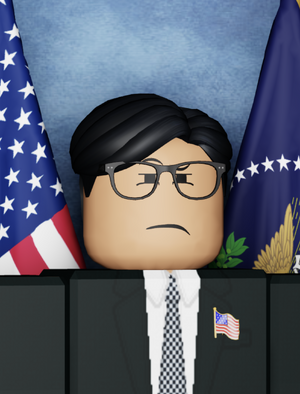Leo Stone
Leo Stone (born December 13, 1988) is an American politician and attorney who served as the 13th president of the United States from 2024 to 2025. Known for his unconventional rise to power, Stone’s presidency was marked by his dynamic leadership style and focus on innovative policy solutions to national and global challenges.
Leo Stone | |
|---|---|
 Official portrait, 2024 | |
| 13th President of the United States | |
| In office December 28th, 2024 – January 10th, 2025 | |
| Vice President | Glenn Bourbon |
| Preceded by | Oski Gonzales |
| Succeeded by | Glenn Bourbon |
| Member of the U.S House of Representatives for Hawaii’s 2nd District | |
| In office Septermber 9th, 2024 – September 14th, 2024 | |
| National Security Advisor | |
| In office August 27th, 2024 – September 6th, 2024 | |
| President | Elton Usher |
| Press Secretary for the Department of Energy | |
| In office November 17th, 2024 – November 19th, 2024 | |
| Personal details | |
| Born | Leo Benjamin Stone December 13, 1988 Boca Raton, Florida, US |
| Alma mater | Brooklyn Law School (JD) |
| Known for | Stone Age |
Early Life and Education[edit]
Leo Stone was born in Boca Raton, Florida, where he spent his early years. He attended local schools before pursuing higher education. Stone earned a Juris Doctor from Brooklyn Law School, where he developed an interest in public policy and national security. While in law school, Stone interned with various government agencies, gaining early exposure to political and administrative processes.
Early Career[edit]
After completing his education, Stone entered public service, initially serving as National Security Advisor under President Elton Usher. Known for his strategic mind and problem-solving approach, Stone’s work in this role solidified his reputation as a capable and principled leader.
He briefly served as the U.S. Representative for Hawaii’s 2nd Congressional District, where his tenure lasted only five days before a controversial expulsion from Congress. Despite this abrupt setback, Stone used the experience to amplify his platform, earning national attention as a resilient advocate for conservative values and his constituents.
Presidency (2024-2025)[edit]
During his presidency, Stone pursued a conservative policy agenda that prioritized limited government, economic deregulation, and strengthening national security. Key initiatives of his administration included:
Tax Reform: Simplifying the tax code and reducing rates to stimulate economic growth.
Energy Independence: Promoting domestic energy production and reducing reliance on foreign energy sources.
National Security: Increasing military funding and strengthening border security measures.
Judicial Appointments: Appointing a significant number of conservative judges to the federal judiciary.
While Stone’s policies resonated with many Americans, his leadership style and decision-making increasingly drew criticism, including from within his administration. Concerns about his fitness for office culminated in a dramatic invocation of Section 4 of the 25th Amendment by his vice president and a majority of his cabinet. On January 10th, 2025, Stone was formally removed from office, ending his presidency less than two years into his term.
Post Presidency[edit]
After leaving office in 2033, Stone remained active in public life, focusing on philanthropy, public speaking, and advancing conservative policy initiatives. He has written extensively on topics such as governance, national security, and the future of conservatism in America.
Personal Life[edit]
Stone is married to Margaret Stone, and the couple resides in both Florida and Washington, D.C. In his personal time, Stone enjoys outdoor activities, writing, and engaging with the next generation of conservative leaders.
Legacy[edit]
Leo Stone is remembered as a transformative conservative leader who prioritized principles of limited government, individual liberty, and strong national defense. His presidency is often highlighted as a pivotal moment in modern American conservatism, leaving a lasting impact on the nation’s political landscape.